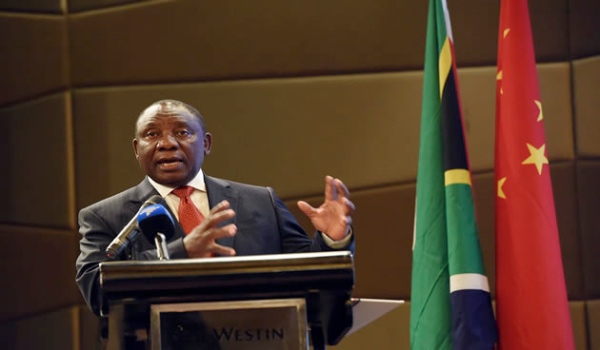

Follow us on:  
|

The Covid-19 crisis has accelerated change for the better

President Cyril Ramaphosa won reviews of his cabinet shuffle but this was soured by the new land re-appropriation motion [Image: GCIS]
Sharing this message of hope was something that DA leader John Steenhuisen addressed in his opening remarks.
“What an honour and a pleasure to speak with you here today, and particularly on a topic as hopeful and inspiring as DA governments and the way they constantly push the boundaries and change the game to improve people’s lives. This is not something we speak about often enough. We have so much else on our plates – and the landscape in which we work moves at such a breakneck pace – that we seldom have time to pause and reflect on these things,” he said.
Many development economists stress the need for innovation to spur progress, which is why many countries and regions host Innovation Summits to spread this message and why research organisations measure how countries do and where they can improve. That is why the European Union hosted an Innovation Summit in January 2021 and why Bloomberg publishes an annual Innovation Index.
The index ranks the world’s 60 most innovative countries using seven criteria including research and development expenditure as a percentage of GDP, productivity, patent activity, concentration of researchers, including postgraduate PhD students, engaged in research and development (R&D) per one million people, concentration of high-tech companies, and tertiary education efficiency.
The only African countries to be ranked are Algeria and South Africa.
South Korea returned to the top spot overtaking Germany which placed first last year and dropped to fourth place this year. Singapore ranked second and Switzerland third. South Africa improved by three places and is ranked 47th.
Among the seven categories it ranks best at 28 for patent activity and worst at 58 for tertiary education efficiency.
The reason for the improvement stem in part due to the DA’s innovations and partly due to the fact that South Africa is one of only 20 countries in the world that has a Fourth Industrial Revolution (4IR) Commission to guide public policy and so foster innovation.
The euphoria that accompanied the election of Cyril Ramaphosa as leader of the African National Congress (ANC) in December 2017 has morphed into a dystopia, as business executives wonder whether the ANC is capable of leaving its ideological baggage of Marxism / Leninism behind and instead embraces the Fourth Industrial Revolution (4IR). It is to address this skepticism that Ramaphosa in April 2019 announced the establishment of a 30-member commission to guide government policy with regards to 4IR.
It was to contrast the DA’s performance with those of ANC-controlled provinces and municipalities that the DA hopes to make inroads in the local government elections due later this year.
“It is also in our governments that we are able to put the largest expanse of clear blue water between ourselves and the ANC. Where we are able to demonstrate clearly and undeniably, backed up by irrefutable evidence, that people live better, more fulfilled lives where the DA governs. We have been doing so for many years already, not only in the Western Cape and Cape Town, but also in other metros under extremely challenging coalition arrangements, as well as in almost 30 municipalities across four provinces,” Steenhuisen noted.
The summit focused on four areas – Covid response, economic development, energy security and water resilience – which were chosen to showcase the very best of the DA in government so that other provinces and municipalities could learn from these experiences.
In terms of Covid response, Western Cape Premier Alan Winde highlighted the rapid deployment of field hospitals, which prior to the pandemic would have taken months to prepare, but due to the urgency the field hospital in the Cape Town International Convention Centre was finished within a month.
He also praised the hands-on approach taken by staff members who for instance made sure that the field hospitals had WiFi connectivity without anybody having this sort of task written into their Key Performance Agreement.
Cape Town Mayoral Committee Member for Economic Opportunities and Asset Management, Alderman James Vos, said the city had made sure that as few people lost their jobs as possible as tourism was a major economic activity in Cape Town. He noted that the city’s Enterprise and Investment Department had rolled out a business retention and expansion program designed to help business in distress as well as assist in expanding current operations.
As for energy security, the summit noted that Stellenbosch and George, both DA-governed municipalities, have made important progress this week in the goal of procuring renewable energy to protect their residents from a failed Eskom that had to institute load shedding. Each day and stage of load shedding cost the economy R1 billion in other words two days of stage 2 load shedding costs R4 billion.
In Cape Town the municipal-owned Steenbras pumped storage scheme allows the city to mitigate load shedding so that when there is a Stage 2 load shedding as is currently the case from noon on February 5 to 11pm on February 7, Cape Town residents only experience Stage 1 load shedding.
In terms of water resilience, the DA-governed Hessequa municipality is using solar powered desalination plants to provide clean water to residents.
Cape Town Alderman Xanthea Limberg showed how the City of Cape Town had reduced its water consumption in response to three years of drought so that the city avoided Day Zero when the taps would have been turned off. In terms of innovation, Cape Town is piloting fog harvesting at two sites on Table Mountain.
Helmo Preuss in Makhanda, South Africa for The BRICS Post